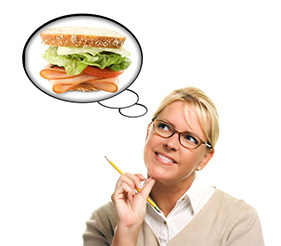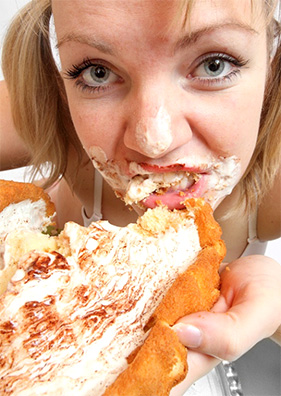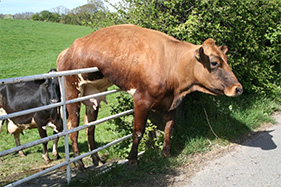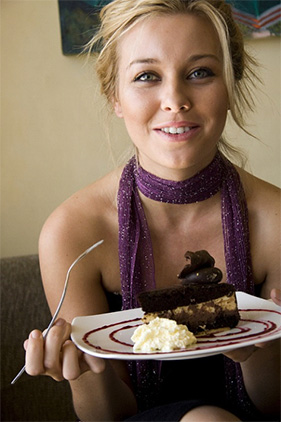The thin woman's Brain
-
For the past two decades the field of neuroplasticity, the science behind rewiring the brain, has had consistent success in helping people with a range of challenges from alcohol or drug addiction to depression to obsessive-compulsive behavior. These success stories juxtaposed with how Naturally Thin Women relate to food prompted my two crucial questions:
- What exactly are the brain-level differences between "naturally thin" women and chronic overeaters? And more importantly:
- Can we rewire our brains to experience food like a Naturally Thin Woman?
With these two questions I embarked upon the final leg of my journey toward peaceful thinness. My first task was to interview several Naturally Thin Women. After multiple interviews of women as diverse as the rainbow - from a street vendor to a former U.S. Congresswoman, from a high school dropout to a college professor, from stay-at-home moms to senior executives - I found nine key behaviors that they shared:
- A Naturally Thin Woman does not obsess about food; only physical hunger prompts her to eat.
- A Naturally Thin Woman enjoys food, but it is not the obsessive love affair experienced by most overeaters.
- A Naturally Thin Woman makes time to enjoy her meals.
- A Naturally Thin Woman can assess her body's needs against her food options.
- A Naturally Thin Woman dislikes the physical discomfort of being bloated or stuffed.
- A Naturally Thin Woman eats whatever she wants while considering the impact of calories.
- For a Naturally Thin Woman food is not her primary source of joy.
- A Naturally Thin Woman's body awareness is attuned with nature.
- A Naturally Thin Woman is able to experience the ups and downs of life.
Let's dig deeper into these nine key characteristics of Naturally Thin Women and contrast these characteristics to those of chronic dieters.

A Naturally Thin Woman does not obsess about food; only physical hunger prompts her to eat.
For many years my delusion was that Naturally Thin Women dreamt about carrots while I fantasized about pizza and ice cream. After I became food obsessed, there wouldn't be a period of more than 40 minutes in my typical day where I wasn't contemplating breakfast, planning a morning snack, scheduling lunch, strategizing an afternoon snack, arranging a light dinner, and then rewarding myself with a late evening snack. If I could not sleep, I knew that stuffing myself would help me fall asleep. I was "hungry" most of the time. Food was the pleasure of my life. Food was the dependable friend that would energize me, allow me to power through physical limitations to complete my work, soothe me, and give me an excuse to get together with friends. Food was constantly and permanently in my mind. Food had become my lover.
In contrast, for a Naturally Thin Woman, food is a physical necessity, similar to how most of us feel about filling the car with gas. Some of us fill our tanks every Sunday night, others as soon as it gets to the 1/4-tank mark, and there are those who wait until the engine is running on fumes. Most overeaters seldom experience true hunger - like hearing our stomachs growl or feeling out of sorts because our blood-sugar level is a bit low. We think about food around the clock, taking every possible excuse to snack and dine and eat again. Our obsession with food grabs us like an emotional undertow and repeatedly drags us away from the shoreline of healthy eating.
Biologically, the overeater's brain is food-obsessed, which is not natural for human beings. These restrictions affect the neural nets in the appetite-control center of the brain and lead to what has been termed "famine brain," the driving obsession that locks our brain into compulsive longing for food. So, paradoxically, dieting is the perfect mechanism for developing the food obsession that is characteristic of most overeaters. And how is this obsessive, persistent brain state developed?
One of our fundamental biological imperatives is to nourish ourselves. Whenever the body experiences a drop in blood sugar level or a lowering of our fat content, it triggers a small army of hormones that we experience as overwhelming and compulsive mandates to eat. Within our brains lie receptors wired so that once the brain is in famine mode it drives us to overeat. The biological intent of these mechanisms was to be able to endure periods of food shortages. Our brains are wired to drive our bodies to eat when we experience low sugar levels and to over-consume food once it registers a drop in body fat. These mechanisms evolved over thousands of years to ensure our survival. The glitch is that the brain cannot differentiate between a body with excess fat and a body that has depleted its fat stores and is truly starving. The survival mechanisms that compel us to overeat are triggered by even the smallest drop in body fat.
Food obsession also stems from the suppression mechanism that restricts or forbids certain foods and encourages others. When we diet we forbid ourselves from having fat, sugar, carbohydrates or whatever it is that we are not supposed to eat during the diet. Harvard School of Medicine's Daniel Wegner, Ph.D., conclusively demonstrated that telling our brain not to think about a specific item is the most effective way to make the brain obsess about it. This mechanism has been demonstrated in a brain challenge, "For the next 60 seconds do not think about a polar bear." This restriction - and it can be carbs, fat, sugar, calories or whatever food category we are supposed to avoid this year - becomes the phenomenon that Wagner terms "ironic monitoring process.". Most of us know it as the Polar Bear Effect.
Most of us have experienced that diets work only under ideal conditions; in other words, when we are hyper vigilant, rested, and relaxed, because it is only then that our suppression mechanism can override the obsession that makes us want to eat. However, as soon as we are stressed or challenged, whenever our willpower is depleted, we immediately seek out the very substance that we have been suppressing. Anyone who has ever been on a diet knows that willpower is not an unlimited resource.
A key experiment jointly conducted at the University of Florida, the University of Utah and Case Western Reserve demonstrated that most human beings have a limited supply of self-control, and after continual demand, that supply can dry up. The scientists termed this phenomenon "ego depletion." Ego is what Sigmund Freud described as our ability to consider the consequences of wearing a low plunge blouse to work, or slapping someone on the face. The researchers determined that a task requiring self-control can have a hindering effect on a subsequent task also requiring self-control, even if these tasks are completely unrelated.
The "ego depletion" studies have been critical in obliterating the commonly held notion that there is infinite willpower and that the issue with most women who don't adhere to their diets is lack of willpower.
A Naturally Thin Woman enjoys food, but it is not the obsessive love affair experienced by most overeaters.
Once a Naturally Thin Woman experiences physical hunger, she selects what she will eat; choosing food is not an obsessive or fantastic reverie. Whenever I used to think about food, my brain lit up like a pin-ball machine. Whereas a Naturally Thin Woman derives sensory pleasure in her body from the physical act of eating, my greatest pleasure was generated by fantasizing about the pleasure of the food, daydreaming in my head about the amazingly delicious food I was going to eat - sometime soon.
Think of it this way. Suppose you've met someone that you feel overpoweringly attracted to, so much that you spend days or weeks fantasizing about the idyllic romantic encounter that will transpire the next time your paths cross. And then you actually spend time with this man and your impeccably scripted plan becomes a terribly awkward exchange that leaves you feeling disillusioned and wondering how on earth you convinced yourself that this man was your perfect mate. The food obsessed brain invests a great deal of time planning the next eating rendezvous, and in most cases, the act of consuming the food is not as satisfying as the fantasy itself.
Naturally Thin Women do not tell themselves that in order to continue being thin they cannot eat specific foods. This is perhaps one of the most surprising differences between the wiring of Naturally Thin Women like Alexandra and a Will-Powered Thin Woman like Piper. Alexandra thoroughly enjoys bread, butter, and fat-laden foods, trusting that she will stop indulging in them when her body tells her that it is satiated. Piper will avoid these foods like the plague because the diet du jour says she is not supposed to eat them.
For the Naturally Thin Woman, there is no struggle or emotional charge around eating, or for that matter around having fattening food in the house. There is no love-hate relationship with food, no negotiating with it. Eating is a pleasure, a sensual joy; it is wonderfully satisfying.
Because of the Polar Bear Effect most overeaters have a short sprint of sublime adherence to a specific set of eating regimens, followed by an explosive burst of binging or long periods of "I don't give a shit" - stuffing themselves with whatever food bears the label "I'm-not-supposed-to-eat-this." Their relationship with food runs the gamut from iron-willed self-control to a frenzied, all-bets-are-off tornado.
A Naturally Thin Woman makes time to enjoy her meals.
There is nothing more delicious than eating a meal when we have a genuine appetite. Our taste buds are alive; we are able to experience flavors, discern textures, and fully delight in aromas. Physical hunger has specific body signals and sensations - our mouths water at the sight of food; we can experience heightened sensations of texture in our cheeks, teeth, tongue, and upper palate; our stomach rumbles; we experience low blood-sugar levels. From these awakened body sensations, most Naturally Thin Women experience physical hunger, and it is then that they begin to plan what would feel good to eat.
I spoke with several Naturally Thin Women who shared how they experience the act of eating. They talk about preparing a beautiful meal; they use words like symphony, velvety, luscious, silky, kaleidoscope, stimulating, explosion. Eating is an enchanting love affair - unhurried, present, and explorative, even seductive. In fact, they would rather not eat than hurry through the experience (perhaps just grabbing a small snack to tide them over). In contrast, it used to take me three minutes flat from the time the food was in front of me to the time it was gone. I ate like a piranha. Unlike Alexandra, there was no courting, no preparation, no planning, no first date; it was locate, acquire, devour. Once we get in the habit of overeating, we attempt to attain the mental spectacle that had been marinating for hours prior to the physical act. So by the time the food was in front of me, the actual experience of eating could never match the fantasy that had been indulged in my mind.
The wiring to fully experience food explains why many Naturally Thin Women "forget to eat" when their lives are in chaos; they don't experience pleasure in hurrying through a meal, as it is inconsistent with fully enjoying it. Setting time aside to enjoy a meal is a stark contrast to the three-minute "fast foods" or "eating on the run" that many of the rest of us call eating. Once we understand famine brain, we understand why for most overeaters hunger feels like an overwhelming imperative that fuels a compulsion never experienced by Naturally Thin Women.-
A Naturally Thin Woman can assess her body needs against her food options.

A Naturally Thin Woman trusts the messages from her body and honors its desires; if she truly wants a piece of cheesecake, or pizza, or whatever it is that those of us who stopped trusting our body messages will not allow ourselves to eat, she will eat it. Most Naturally Thin Women will not eat food that does not appeal to them. What's the point? If she doesn't like her choices, her internal dialogue goes like this: "If my only options are yucky food, I'd rather have a snack until I can sit down and enjoy what I truly want." Or if she truly doesn't have the time to eat, she will say to herself, "I'd rather postpone my meal; I don't enjoy rushing through the experience." Yes, genuine hunger will drive her to eat, but only if it's a positive experience; she is not driven by famine brain and her choices are not propelled by compulsion. Once she becomes physically hungry, Alexandra is very specific as to what she prefers to eat. With a healthy mind-body connection, unimpeded by all the fear of being FAT (when we don't trust our instincts), Alexandra has access to her hunger needs and can clearly express them:- I am hungry.
- This doesn't appeal to me.
- That looks really yummy!
- Yuck, that doesn't taste good. I'm not eating it.
- I am thirsty, not hungry.
These body-level trusts are in huge contrast to thin women like Piper who are constantly negotiating calories, which then fuels an internal argument with her innate desires:
- That's all I'm supposed to eat, and damn it, I'm not eating any more.
- I will NOT allow myself to be FAT.
- It's only two more hours before I can eat. I will force myself to wait it out.
- I'll drink water until it's time to eat.
- I'll do something else to distract myself.
These are important distinctions; the Natural Thin Woman trusts her appetite, what sounds good to eat, and her needs to enjoy the meal. She also knows that having to rush through a meal is not pleasurable and so she would rather eat a snack and wait until she has the time to enjoy the meal. She eats with a confidence and a trust that she will not gain weight.
-
 A Naturally Thin Woman dislikes the physical discomfort of being bloated or stuffed.
A Naturally Thin Woman dislikes the physical discomfort of being bloated or stuffed.
In fact, the word consistently used by Naturally Thin Women to describe the feeling of being stuffed was HATE. "I HATE feeling stuffed." "I don't care if I'm eating with the Queen of England at the most sumptuous gourmet feast on the planet. Once I am full, nothing will make me overeat." Someone once attempted to entice Alexandra to finish what was left on her plate, and she responded, "I don't give a shit if there is food on the plate. I'm not a garbage can; I'm FULL."
Alexandra once told me that she thinks of her stomach as being the size of a softball and she knows that filling it beyond its limits has negative consequences:- I feel like I'm tied down, a lead balloon, uncomfortable in my clothes.
- I feel hostage to my body; it limits my ability to do so many other activities.
- My range of movement is limited, and simple activities, like walking up stairs, are miserable.
- It compromises the quality of my life.
- If I really like the taste of something and I'm full, I can have more later... when I'm not full and I can enjoy it. Duh.
Being full was a foreign concept to me. I always ate whatever was on the plate, I always went for seconds, and I always, always wanted dessert, often my reward for going without bread, or for eating greens. The idea of being full occurred only when I had stuffed myself so grossly that it was physically unbearable to move. I would not stop until I reached a level of being so stuffed that I felt disgust and shame and physically could not eat anymore.
It is a gift to trust our bodies when they generate evidence of satiation: I've enjoyed the eating experience and now I'm full. That complete trust, the absence of anxiety, allows us to eat without anxiety or compulsion. One additional, and important, distinction between the Natural Thin Woman and the Will-Powered Thin Woman is the ability to trust their body messages, to recognize once it is satiated. I once asked Alexandra how she can tell when she's full. The answer was so simple it floored me. "The food loses its taste. It doesn't taste as good as when I began eating. The taste becomes bland." Women like Alexandra can discern when they are full; they trust the signals that their bodies generate.
Once I began eating like a Naturally Thin Woman, I no longer worried about being sleepy in the afternoon because I ate too much at lunch. I am now able to enjoy much more of life because I am not recuperating from a large meal. I can schedule dancing or a brisk walk right after dinner because I'm not down for the evening. Knowing and trusting the sensation of fullness has increased the quality of my life significantly. 
A Naturally Thin Woman eats whatever she wants while considering the impact of calories.
Eating the way Naturally Thin Women eat, if I have a desire for a sub, pizza, fettuccini Alfredo, Haagen-Dazs or chocolate, I will honor that desire and have that exact food. I don't worry about overeating because I have learned how to eat mindfully (more on this in Chapter 4), and I know that the taste of the food will not be as enticing once my body has had enough. I savor every bite, but I stop eating the moment it loses its taste. Eating the entire carton of ice cream no longer has any appeal.
Alexandra shared with me her internal dialogue, which goes something like this: "Yes I could have this donut because it is sitting right here in front of me, but I'd rather eat that luscious piece of chocolate that I really, truly want." Forfeiting the donut because we prefer to eat chocolate is an example of the distinction between choice and self-deprivation.Naturally Thin Woman
- "I choose"
- "I prefer"
- "I'd rather"?
Will-Powered Thin Woman
- "I will make myself"
- "I can't have"?
- "It's not in my diet"
For a Naturally Thin Woman, each calorie has to be worth it, and the brain reacts very differently to a choice than to a denial of our basic desire. When we constantly control and constrain our eating by sheer willpower, our brains are running the famine avoidance programming, a biological imperative that drives our compulsion to overeat. It explains why we feel totally out of control during binging episodes.
Trusting that we will stop eating when we are full allows us to choose the foods that we find appetizing. Instead of relying on will power, what we need to restore is our healthy neural nets; we need to allow the famine brain wiring to atrophy.- For A Naturally Thin Woman Food is Not Her Primary Source of Joy
Studies show an irrefutable negative correlation between experiencing joy and predisposition to addictive substances. For example, a Simon Fraser University study, led by psychologist Bruce K. Alexander, documented that when mice lived in mice nirvana, the mice were 91% less likely to indulge in drug-laced sugar water. This study, known as "Rat Park," provided an enriched environment for the rats, both physically and socially, with an abundance of balls and wheels for play and enough space for mating and raising litters. Other studies like Rat Park have conclusively demonstrated that the more joyful and connected to the life source a person feels, the less likely that person is to support an addiction.
What is important is your own personal experience. When you are engaged in activities that you find joyous, you are less likely to overeat. Part of this work will show you how to identify activities that align you with joy while recognizing those that make you inexplicably hungry. Learning this distinction leads to a life where, instead of searching for food when you are out of balance, you begin to search for true nourishment.
-
A Naturally Thin Woman's body awareness is attuned with nature.

Artificial lighting became widely available in just the last 100 years of our human history. Before we had artificial lighting the rhythm of our day was dictated by sunrise and sunset. We were part of the natural world and the forces that act upon it, such as the sun, moon, wind, and rain.
The Chinese articulated their version of these natural rhythms thousands of years ago. They talked about the rhythmic circulation of Qi (energy), how there was an organized flow of this energy throughout the day from one organ system to the next, how the ebb and flow of this Qi correspond with different human cycles that occur during the day. For instance, because the stomach and spleen are at their peak function between 7 and 11 A.M., this would be the time for optimal digestion of nutrients. Ayurveda, an ancient Indian system, believes that optimum digestion is between 10 A.M. and 2 P.M. This knowledge correlates with what we today call circadian rhythms and it is why eating a larger breakfast and lunch and a smaller dinner (when digestive function is slowing down) is optimal for restoring alignment with nature. Interestingly, according to the Chinese the peak function of the large intestine is 5 to 7 A.M., just prior to the peak time for digestion. This suggests that the natural rhythm is to empty our digestive system in preparation for beginning the cycle all over again.
We have adapted to our sociological structures and many of us have moved our heaviest meal to nighttime. Most Naturally Thin Women that I interviewed expressed a preference toward eating a light supper and reserving breakfast or lunch for the larger meal. 
A Naturally Thin Woman is able to experience the ups and downs of life.
- For a Naturally Thin Woman, disappointment leads to expression; she is able to articulate "I'm disappointed" as opposed to suppressing it with food.
- For a Naturally Thin Woman, sadness leads to tears; she becomes a despondent child that weeps in contrast to an emotional overeater that raids the refrigerator and then wonders why.
- For a Naturally Thin Woman, anger might lead to throwing plates against the wall, but in most cases she is able to give it verbal expression, instead of the emotional overeater who suppresses her anger by stuffing her face.
- For a Naturally Thin Woman, being tired means sleep, even if it means a catnap on the floor, or going home for a few hours to rest.
- For a Naturally Thin Woman, loneliness leads to reaching out, talking to a close friend and expressing her loneliness.
- For a Naturally Thin Woman, stress means a long run, a few yoga postures, meditation, or acknowledging what was causing the stress.
Whereas persistent and recurrent emotional imbalances would send most overeaters toward food, Naturally Thin Women face and experience all of the emotions that are part of the human experience. Once accepted, these emotions need to be felt, expressed, embodied and finally released by crying, reaching out to a friend, jogging, whatever strategy helps us be with our feelings. Eating will only replace the avoidance of the emotion with self-loathing.
In order to end the cycle of "on-a-diet"? and recognize it as "on-denial," it is essential to accept and experience our emotions fully.